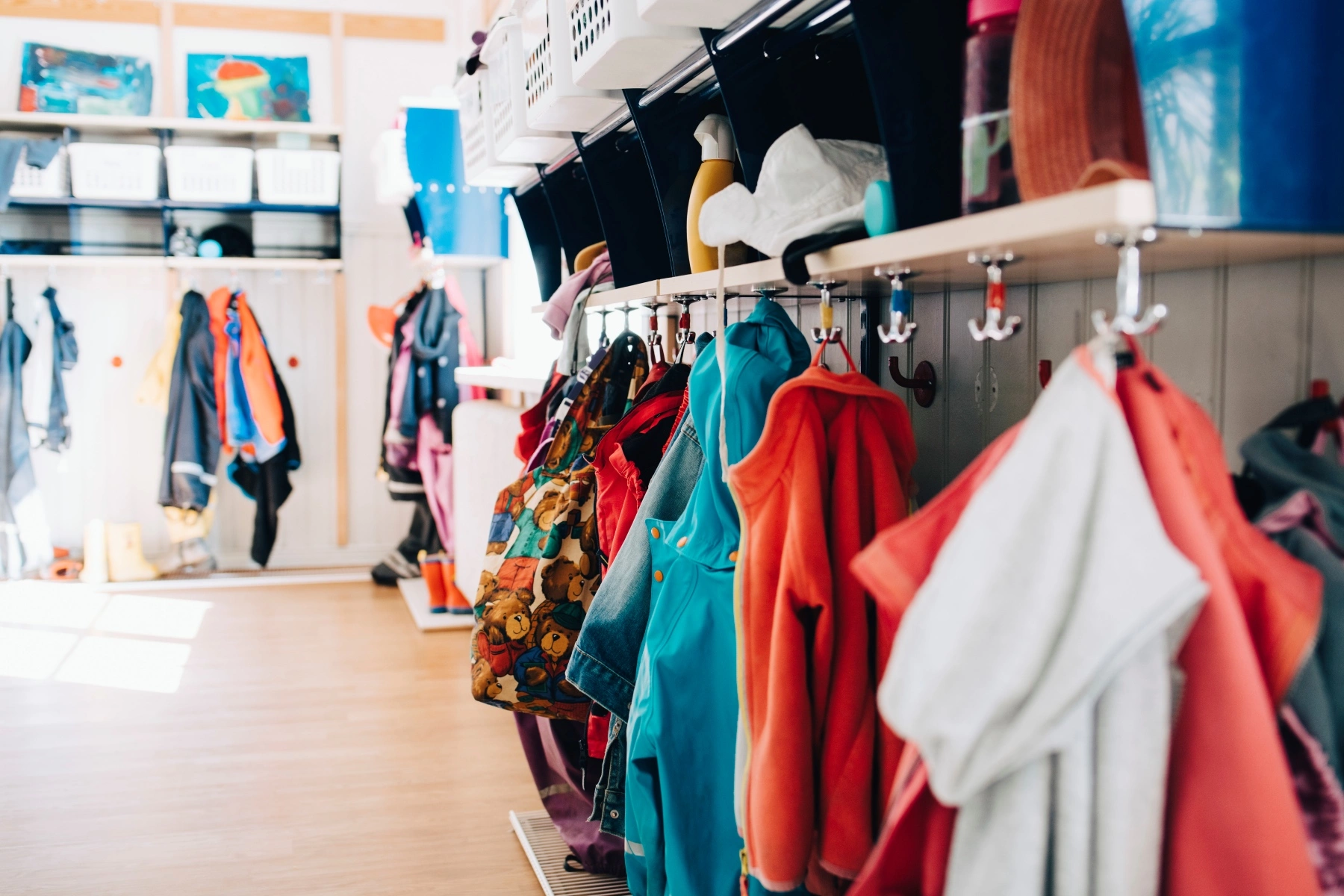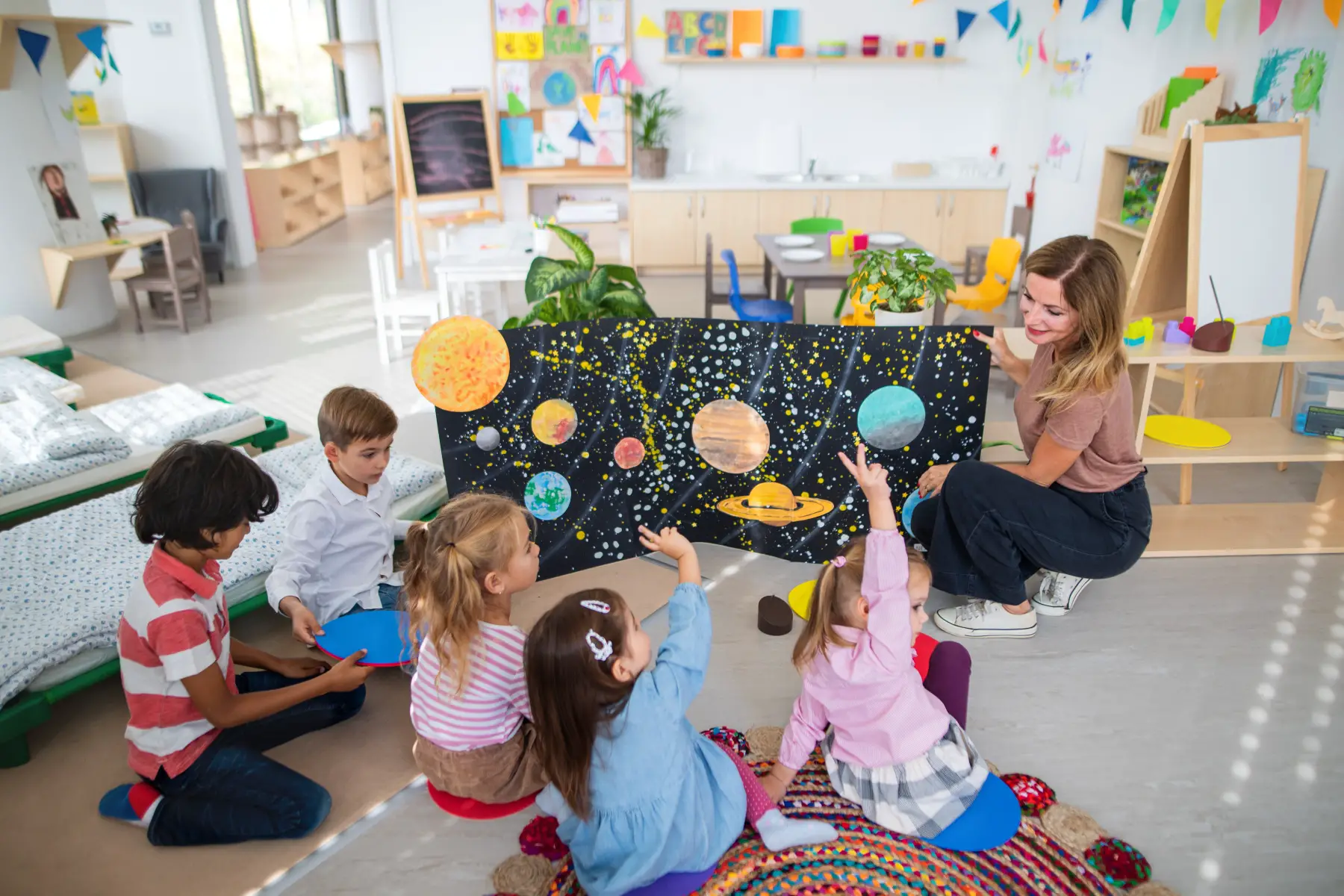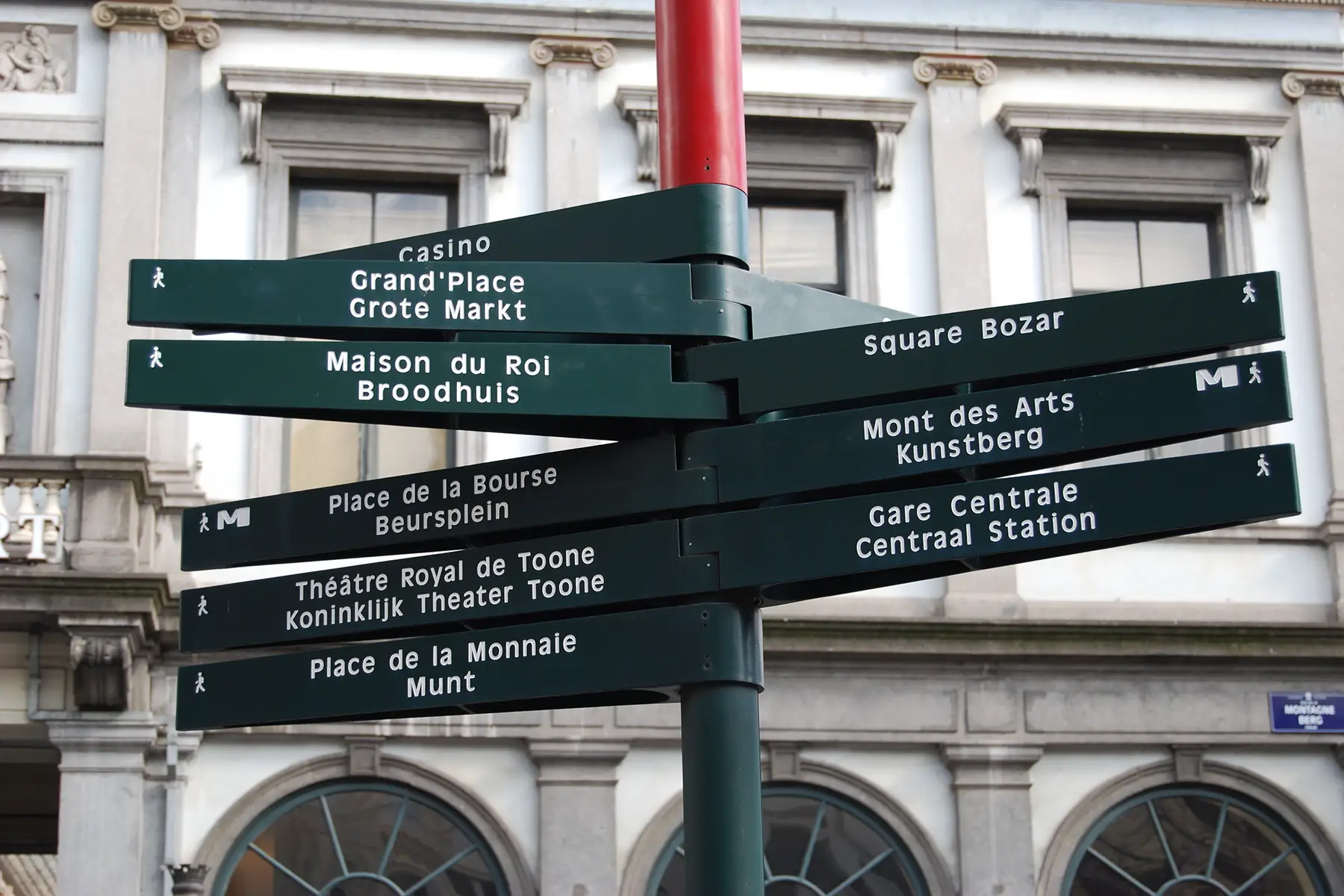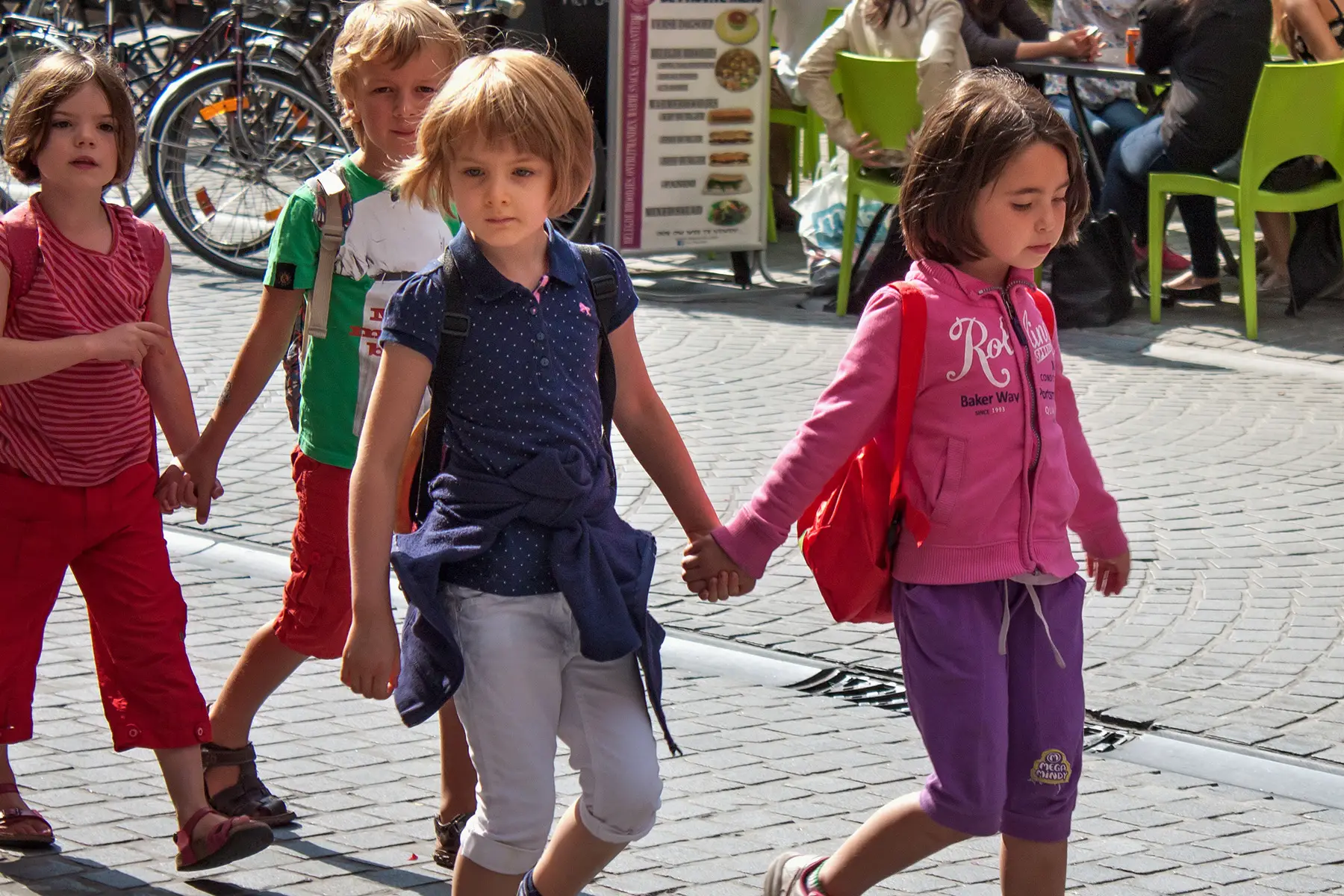As an expat, enrolling your child in preschool is a big step with a lot of considerations. In fact, just finding the best place for your little one can feel like an overwhelming challenge, especially for first-time parents. However, fortunately, there are plenty of options when it comes to preschools in Belgium. And to help you familiarize yourself with how they operate, this article walks you through the following:
Childcare in Belgium
When it comes to childcare, Belgium has a range of public and private services that are available for children up to the age of six. This includes daycare centers, childminders, au pairs, nannies, and preschools. Of course, the type of childcare you decide to use will depend on your preferences, as well as factors such as your work schedules, budget, and availability in the area you live.
Types of childcare
In Belgium, daycare centers (Dutch: kinderopvang, French: garderie) care for children in groups of between nine and 18. While some mix the ages together, others choose to keep babies and toddlers separate. When you have an emergency, some parts of Belgium also have short-term childcare centers (Dutch: crisiskinderdagverblijf, French: halte garderie), which are available for children up to six.

Childminders, on the other hand, are home-based carers who look after four or five children at a time. They must be authorized by the government and can either work for organizations or operate independently. Notably, some areas of Belgium have strict training requirements for childminders, while others have none. Therefore, it is important to ask about this when screening potential carers.
Another childcare option is to hire an au pair, which is essentially someone who lives with your family full-time and helps take care of your child in exchange for accommodation, meals, and a minimum monthly allowance of €450.
For less regular support, however, you might want to consider hiring a nanny through an organization such as La ligue des familles or Topnanny. You can read more about these options in our article on childcare in Belgium.
Preschools in Belgium
Once your child turns two and a half, they can attend state-funded preschool (Dutch: kleuterschool, French: école maternelle) in Belgium. Notably, while preschool is not compulsory in the country, more than 95% of parents choose to send their children to one. And fortunately, all infants are eligible to attend preschool, regardless of their nationality or residency status.

Because Belgium is a bilingual country, in which people speak French, Dutch, and German, public preschools also teach in various languages. For instance, the official teaching language in Wallonia is French whereas in the Brussels-Capital region, it is either Dutch or French, depending on the school. Meanwhile, in East Belgium, classes are taught in German.
International preschools, on the other hand, cater to children who speak languages other than Dutch, French, or German. Because of this, they are very popular among expat families. That said, one of the advantages of choosing a local school is immersion as children are exposed to the local language of the region, as well as its culture.
Opening hours
Preschool in Belgium runs from 1st September until 30th June, with several school holidays dotted throughout the year.
They usually operate from 08:30 to 15:30. However, to accommodate the working schedules of parents, most of them offer an additional ‘breakfast club’ that starts at 07:00 and an ‘afternoon club’ with activities that last until 18:00.
Most preschools also provide hot meals during lunchtime. However, again, this will vary from school to school, so it is important to ask about this when researching your options.
What do children do at preschool?
Although preschools in Belgium are government-funded, there is no set national curriculum. That said, they generally focus on teaching children how to develop important language and social skills, as well as developmental skills such as how to use the bathroom and wash their hands.
Most preschools are also connected to primary schools, allowing children to smoothly transition from one to the other and ensuring continuity with their schoolteachers and classmates. However, parents are free to send their children to a different primary school if they prefer. Notably, some schools also offer special pre-primary education for children with special needs or disabilities.
How to find and choose a preschool
Before choosing a preschool, it is important to consider what is important to you and your child. For instance, is the language of instruction and teaching style suitable for your little one? Moreover, is the school recognized by an official institution? Is it connected to a primary school to ensure a smooth transition when they are ready to move on to compulsory education? Does the school provide meals that your child is likely to eat? And what costs are covered by the fees?

Of course, you can also ask for recommendations, based on your criteria, within your expat circle. Once you have narrowed down your options, it is a good idea to visit the different preschools to get a sense of their culture and the resources they offer.
However, it is important to be aware that some preschools have long waiting lists due to their popularity among expats. In fact, competition can be so fierce that some couples register their child before it is even born. Therefore, it is wise to sign up as soon as possible.
It is also worth noting that although you don’t have to apply to the preschool that is closest to where you live, you will have a better chance of securing a place if you apply to one nearby. Moreover, some schools may give priority to siblings, children of staff, and those with French or Dutch-speaking parents.
The enrollment process
The process for enrolling your child at preschool will look different depending on where you live. Registration dates will also vary. However, generally speaking, you can either register online or by phone from January until early April.
When applying, you will typically need to provide the child’s birth certificate or passport, proof of residence, and medical history, including their vaccination record. Of course, you will also need to provide your emergency contact details.

Fortunately, it is not common for children to have to undergo an interview before being accepted into a preschool in Belgium.
How much does preschool cost?
Fees for government-subsidized preschools in Belgium are based on the income of the parents. As a result, they can vary from €1 to €30 a day. Because of this, you will need to show proof of your income when applying to them. Private institutions, on the other hand, set their own individual prices, regardless of parents’ income.
Fortunately, childcare payments are tax deductible in Belgium and parents also qualify for child benefits, which can help offset some of the costs of preschool. You can read more about this in our article on social security in Belgium.
International preschools in Belgium
As mentioned, if you want your child to learn in a language other than Dutch, French, or German, you might want to consider enrolling them in an international preschool in Belgium. These are essentially private, fee-based centers that cater to a non-Belgian clientele.
Similar to public preschools, international ones are often attached to primary schools and may teach in English or another language that is not widely spoken in Belgium.
Because they are private organizations, they do not have any limitations when it comes to setting fees. Therefore, tuition can range anywhere from €10,000 to €20,000 per year.
What do children do at an international preschool?
Given that international preschools in Belgium follow various curricula from various countries, daily activities and schedules can vary. Therefore, it is important to explore this when visiting each school.
That said, children are generally encouraged to acquire important personal skills that will help them become more independent in life. Notably, some preschools also offer bilingual programs to help nurture multiple languages.
The advantages of international preschools
Naturally, there are some advantages to sending your child to an international preschool in Belgium. For instance, if you don’t plan to stay in the country long-term, or want your child to study in a different language, they offer a simple solution.

International preschools also offer the opportunity for students to study alongside a diverse group of children, which can help develop their cultural awareness. Moreover, teachers are well-equipped to support the students when it comes to facing the unique challenges that come with living abroad.
Finding and choosing an international preschool
Given that Belgium is not a huge country, the easiest way to choose a preschool is to narrow down your options based on the language of instruction and location. You might also want to consider the maximum distance you are willing to travel to drop them off and pick them up. Of course, you can also ask for recommendations within your expat circle.
Again, it is important to visit each preschool to get a sense of the culture and resources available and to sign up as soon as possible to avoid a long waiting list.
International preschools are available in several cities in Belgium, including Brussels, Tervuren, Waterloo, Leuven, and Antwerp. There are also numerous international schools that offer preschool facilities throughout the country, so it is worth searching for ones in your area.
How to enroll in an international preschool
Because international schools operate independently, the process for enrolling your child will vary. For instance, some schools may require a family interview or assessments, while others may not. Therefore, be sure to ask about this in advance. That said, you will generally be asked to provide the child’s identification documents as well as their medical history and vaccination record.
It is also worth bearing in mind that, unlike state-funded preschools, international ones have the right to turn away whichever students they want. With this in mind, be sure to get all the information you need during your visit and express your interest as soon as possible.
The cost of international preschools
As mentioned, international preschools are allowed to set their own fees. As a result, the cost will vary from school to school, ranging anywhere from €10,000 to €20,000 per year. Factors such as location and the level of education may also influence this. It is also important to be aware that as a student progresses on to each additional year, tuition prices will also increase.
Before accepting a position at an international preschool, it might be worth negotiating with your employer to see if they are willing to pay the school fees on your behalf. Depending on the job contract you have, this may be an option.
General tips for preschool in Belgium
Whether you decide to enroll your child in a public or an international preschool, it is important to help prepare them for their first day. Therefore, you can ask the staff what they need to bring.
For instance, do the children play outside in all kinds of weather? If so, will you need to pack some waterproof clothes for them? On that note, it is a good idea to leave an extra change of clothes with the staff in case your child has an accident or gets messy.
You should also check if your child is likely to eat the meals that are provided. And, of course, be sure to label their belongings with their name and provide your emergency contact information. Following just a few of these tips will help your little one settle into preschool in no time.
Useful resources
- European Commission – provides information about family benefits in Belgium
- International Schools Database – a database of international schools in Belgium
- International Step by Step Association – a PDF factsheet on The relationship between childcare, home, and preschool in Belgium








